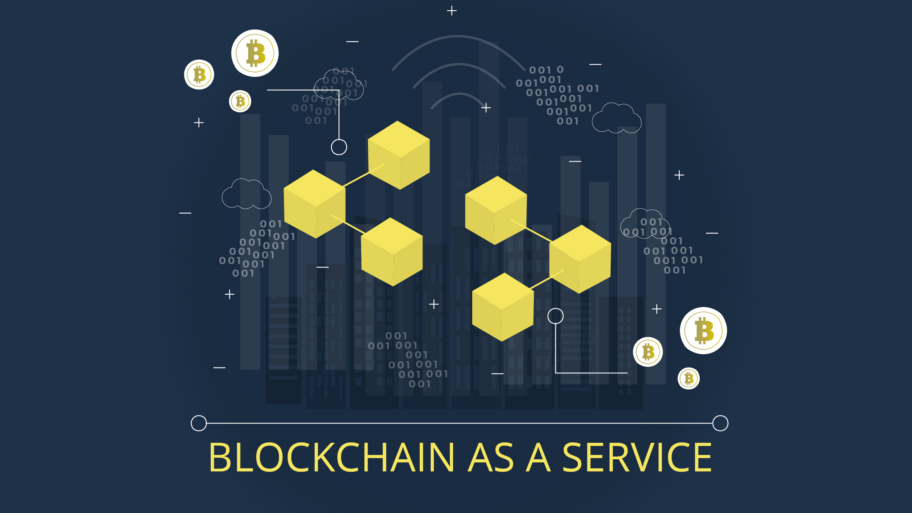Introduction
Blockchain technology has evolved far beyond the hype of cryptocurrencies. While Bitcoin and Ethereum were the first use cases that brought global attention, businesses today are exploring blockchain for much broader applications—from supply chain management to digital identity, from cross-border payments to healthcare data security. However, building and maintaining a blockchain network is highly complex and resource-intensive, requiring deep expertise, infrastructure, and ongoing maintenance.
This is where Blockchain-as-a-Service (BaaS) comes in. Much like how cloud computing revolutionized IT by offering on-demand infrastructure and software services, BaaS is doing the same for blockchain. Companies like Microsoft Azure, Amazon Web Services (AWS), IBM, and Oracle are leading the way, offering blockchain infrastructure and tools through their cloud platforms. In 2025, BaaS is emerging as a game-changing trend, making blockchain adoption accessible, scalable, and cost-efficient for enterprises of all sizes.
What is Blockchain-as-a-Service (BaaS)?
Simplifying Blockchain for Enterprises
Blockchain-as-a-Service is a cloud-based service model where third-party providers set up, manage, and maintain blockchain infrastructure for businesses. Instead of organizations having to build their own blockchain networks from scratch—requiring hardware, software, and skilled developers—they can simply subscribe to a blockchain service provided by major cloud vendors.
This model is very similar to Software-as-a-Service (SaaS) or Platform-as-a-Service (PaaS), where companies pay for ready-to-use services instead of managing everything in-house. BaaS abstracts away the complexity, offering pre-configured blockchain frameworks like Hyperledger Fabric, Ethereum, Corda, or Quorum on-demand.
Why is BaaS a Big Deal in 2025?
Main Drivers of Growth
There are several reasons why BaaS is one of the hottest fintech and enterprise tech trends in 2025:
- Lower Costs and Accessibility – Building blockchain networks internally can cost millions of dollars in infrastructure and staffing. BaaS providers offer pay-as-you-go models, making blockchain affordable for startups and SMEs.
- Faster Time-to-Market – Companies no longer need years of development to roll out blockchain-based solutions. BaaS platforms allow businesses to deploy projects in weeks, not months.
- Integration with Cloud Ecosystem – Since AWS, Microsoft, and IBM already dominate enterprise cloud services, offering blockchain within their platforms gives businesses seamless integration with existing infrastructure.
- Rising Use Cases – From central bank digital currencies (CBDCs) to tokenized assets, from logistics tracking to fraud prevention, blockchain applications are expanding rapidly. BaaS enables these use cases without businesses needing blockchain experts.
Key Players in the BaaS Market
1. Microsoft Azure Blockchain Services
Microsoft has been at the forefront of blockchain adoption, offering pre-built templates and integrations with its Azure ecosystem. Enterprises can deploy blockchain networks, connect IoT devices, and integrate AI for advanced data insights.
2. Amazon Managed Blockchain (AWS)
Amazon’s BaaS solution allows businesses to create and manage scalable blockchain networks using Hyperledger and Ethereum. AWS also supports financial institutions in experimenting with stablecoins and decentralized applications.
3. IBM Blockchain Platform
IBM is particularly strong in enterprise blockchain, with use cases in supply chain, food traceability, and healthcare data sharing. Their blockchain solutions are trusted by global corporations and governments.
4. Oracle Blockchain Cloud Service
Oracle provides BaaS solutions focused on enterprise workflows, compliance, and data transparency. Its strong database ecosystem makes it a natural fit for businesses that require high-volume data processing.
Top Use Cases of BaaS in 2025
🔹 Financial Services
Banks and fintechs use BaaS for cross-border payments, trade finance, smart contracts, and digital identity verification. It reduces fraud, improves settlement speed, and enhances compliance.
🔹 Supply Chain Management
BaaS allows companies to track goods in real-time, ensuring transparency from raw material sourcing to final delivery. Walmart and Maersk have already piloted blockchain-based supply chain tracking with BaaS providers.
🔹 Healthcare
Hospitals and insurance providers use blockchain to secure patient data, streamline medical records, and prevent insurance fraud. BaaS makes these implementations easier.
🔹 Government and Public Sector
Governments are experimenting with digital voting systems, land registries, and CBDCs through BaaS solutions. This helps them scale blockchain without spending billions in R&D.
🔹 Energy & Sustainability
BaaS is being used to track carbon credits, manage renewable energy certificates, and monitor energy grids—a key driver for green finance and ESG initiatives.
Challenges Facing BaaS Adoption
While BaaS is booming, there are still challenges:
- Data Privacy & Security Concerns – Storing sensitive business data on third-party blockchain clouds raises privacy issues.
- Vendor Lock-in – Companies that choose one BaaS provider may find it difficult to migrate later.
- Regulatory Uncertainty – Blockchain is still under regulatory scrutiny in many regions, especially for finance and CBDCs.
- Performance Limitations – Scalability remains a challenge when blockchain is deployed at a global scale.
The Future of BaaS in 2025 and Beyond
The global BaaS market is projected to grow at double-digit CAGR, with billions of dollars in investment flowing into blockchain solutions. By 2025:
- More Governments will launch CBDCs through BaaS providers.
- SMEs will leverage blockchain without hiring costly blockchain experts.
- AI + Blockchain Integration will emerge, allowing intelligent automation of smart contracts.
- Multi-Cloud Blockchain Networks will rise, reducing vendor lock-in risks.
BaaS is not just a trend—it’s a strategic enabler of digital transformation, similar to how cloud computing reshaped IT a decade ago.
Conclusion
Blockchain-as-a-Service is set to be one of the defining enterprise technology trends of 2025. By simplifying blockchain deployment, reducing costs, and enabling scalability, BaaS is unlocking opportunities across industries—from finance and supply chain to healthcare and sustainability. With tech giants like Microsoft, AWS, IBM, and Oracle driving innovation, we are entering a new era where blockchain will become as common in business operations as cloud and AI are today.
Companies that adopt BaaS early will not only gain a competitive advantage but also future-proof their operations in an increasingly decentralized digital economy.



















